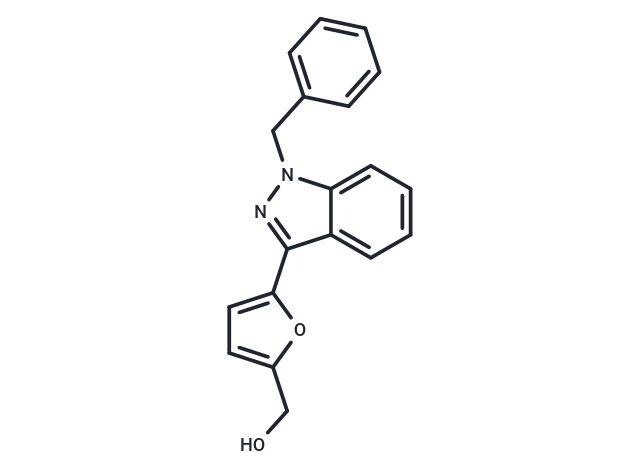Shopping Cart
- Remove All
 Your shopping cart is currently empty
Your shopping cart is currently empty

Lificiguat (YC-1) is an nitric oxide (NO)-independent activator of soluble guanylyl cyclase(sGC) and an inhibitor of Hypoxia-inducible factor-1alpha (HIF-1alpha).

| Pack Size | Price | Availability | Quantity |
|---|---|---|---|
| 5 mg | $43 | In Stock | |
| 10 mg | $61 | In Stock | |
| 25 mg | $127 | In Stock | |
| 50 mg | $252 | In Stock | |
| 100 mg | $432 | In Stock | |
| 200 mg | $639 | In Stock | |
| 500 mg | $987 | In Stock | |
| 1 mL x 10 mM (in DMSO) | $48 | In Stock |
| Description | Lificiguat (YC-1) is an nitric oxide (NO)-independent activator of soluble guanylyl cyclase(sGC) and an inhibitor of Hypoxia-inducible factor-1alpha (HIF-1alpha). |
| Targets&IC50 | sGC (presence of CO):0.6-1.1 μM (Kd) |
| In vitro | Lificiguat increases the catalytic rate of the soluble guanylyl cyclase (sGC) and sensitizes the enzyme toward its gaseous activators nitric oxide or carbon monoxide. Lificiguat alone activates the enzyme only 10-fold, but it potentiates the CO- and NO-dependent activation of sGC, resulting in stimulation of the highly purified enzyme that may be several hundred- to several thousand-fold. It inhibits platelet aggregation and vascular contraction and also inhibits HIF-1 activity in vitro. Lificiguat completely blocks HIF-1α expression at the post-transcriptional level and consequently inhibits the transcription factor activity of HIF-1 in hepatoma cells cultured under hypoxic conditions, suggesting that these effects of Lificiguat are likely to be linked with the oxygen-sensing pathway and not with the activation of soluble guanylyl cyclase. |
| In vivo | In experimental animals, Lificiguat causes the inhibition of the platelet-rich thrombosis and a decrease of the mean arterial pressure. Lificiguat effectively inhibits tumor growth in tumor-bearing mice. In mice, Lificiguat inhibition of HIF-1 activity in tumors, and this is associated with blocked angiogenesis and an inhibition of tumor growth, while the anti-platelet aggregation effect of Lificiguat does not appear to affect tumor growth. |
| Cell Research | Hep3B cells are plated in a six-well plate at a density of 1 × 105 cells/well in α-modified Eagle medium supplemented with 10% heat-inactivated FBS and incubated overnight. Cells are treated with YC-1 (0.01-10 μM) or vehicle (DMSO) for 5 minutes and are then subjected to normoxia or hypoxia for 24 hours. VEGF levels in the conditioned media are quantified by using the Quantikine human VEGF Immunoassay kit. The VEGF concentrations are quantified by comparison with a series of VEGF standard samples included in the assay kit. |
| Animal Research | Animal Models: Male nude (BALB/cAnNCrj–nu/nu) mice. Formulation: DMSO. Dosages: 30 μg/g. Administration: i.p. |
| Alias | YC-1 |
| Molecular Weight | 304.34 |
| Formula | C19H16N2O2 |
| Cas No. | 170632-47-0 |
| Smiles | OCc1ccc(o1)-c1nn(Cc2ccccc2)c2ccccc12 |
| Relative Density. | 1.24 g/cm3 (Predicted) |
| Storage | Powder: -20°C for 3 years | In solvent: -80°C for 1 year | Shipping with blue ice. | |||||||||||||||||||||||||||||||||||
| Solubility Information | DMSO: 70 mg/mL (230.01 mM), Sonication is recommended. | |||||||||||||||||||||||||||||||||||
Solution Preparation Table | ||||||||||||||||||||||||||||||||||||
DMSO
| ||||||||||||||||||||||||||||||||||||

Copyright © 2015-2025 TargetMol Chemicals Inc. All Rights Reserved.